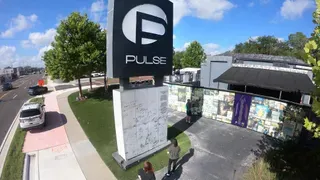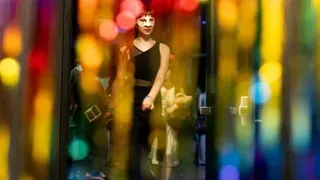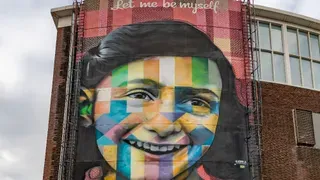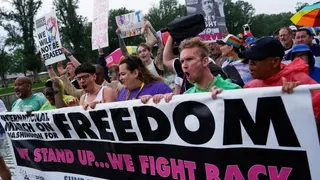April 10, 2015
State-By-State Battle Waged Over 'Conversion Therapy' Bans
Jason St. Amand READ TIME: 4 MIN.
There have been several setbacks this year for a state-by-state campaign to ban so-called conversion therapy for gay, lesbian and transgender youth. But the White House is now officially an ally, and activists are hopeful of long-term success as they make a case that such treatments can have devastating consequences.
Groups advocating the bans were elated on Wednesday when President Barack Obama conveyed his support for measures banning psychiatric therapy treatments aimed at changing minors' sexual orientation. Just hours earlier, a Colorado Senate committee defeated a proposed ban bill there.
"I am hesitant to use the heavy hand of government to take away the dignity of choice in cases where individuals want this therapy," said state Sen. Owen Hill, one of three Republicans who outvoted two Democrats on the committee to block the bill after it had advanced out of the Democratic-controlled House.
According to the National Center for Lesbian Rights, which is a leader of the multistate campaign, Colorado is one of 18 states where bans were being considered this year. Bans were enacted in previous years in California, New Jersey and Washington, D.C., but at this stage it's possible only a handful of other states - perhaps Oregon and Illinois - might join them this year.
With a legislative deadline approaching in Nevada, a bill there appears in jeopardy. In Iowa, a similar measure already has missed a key deadline and in any case was viewed as a long shot in the Republican-controlled House. In New York, the GOP-run Senate has yet to signal enthusiasm for a ban that advanced through the House last year.
However, Samantha Ames, coordinator of the National Center for Lesbian Rights' Born Perfect campaign, said she and her colleagues are heartened by increasing public awareness of the issue, even in states where the proposed measures fail.
"Most people didn't know what conversion therapy was," Ames said. "We are going to put this industry out of business, and the way we do that is through public education and empowerment of the survivors who've been most deeply affected."
Among those who testified in support of the proposed Colorado ban was Sarah Musick of Colorado Springs.
When she told her parents she was gay, Musick said, they forced her to enter a "corrective therapy" program that caused her distress and eventually led to a suicide attempt.
"Today, with my wife by my side, I have overcome much adversity and live an authentic life," she said Wednesday after the Senate panel defeated the ban measure. "Sadly, many in my same place are not, and they deserve acceptance, equality, diversity, and simple humanity. They don't deserve the punishment that is conversion therapy."
Among those testifying against the Colorado ban was Jeff Johnston, an issues analyst at the Colorado Springs-based conservative Christian ministry Focus on the Family. Johnston says he was attracted to other males as a youth, then underwent religiously themed therapy starting in his mid-20s that paved the way to a successful heterosexual marriage.
"If you ban this, you're saying to people of faith who might have unwanted sexual feelings, 'Sorry, we can't help you,'" Johnston said. "You're denying their right to self-determination. You're abandoning these kids when they most need your help."
Many major mental health and family-issues groups have long opposed conversion therapy, including the American Psychological Association.
"So-called reparative therapies are aimed at 'fixing' something that is not a mental illness and therefore does not require therapy," said the APA's president, Barry Anton. "There is insufficient scientific evidence that they work, and they have the potential to harm the client."
In a 2009 report, an APA task force said mental health professionals should avoid telling clients that they can change their sexual orientation. Instead, the APA suggested that such clients "seek psychotherapy, social support and educational services that provide accurate information on sexual orientation and sexuality, increase family and school support and reduce rejection of sexual minority youth."
On the other side of the side of the issue, David Pickup - who offers reparative therapy for unwanted sexual attractions in Texas and California - said he was "offended and saddened" by Obama's endorsement of proposed state bans.
"The public is going to become incensed that these bills are trying to take these rights away from children and adults," he said.
One advantage of the wave of proposed bills, Pickup said, is that legislative hearings and news coverage provide him and his allies with more opportunities to make their case.
There are no firm figures that convey the extent of conversion therapy in the United States. Pickup said many thousands of clients undergo it each year, while Samantha Ames of the National Center for Lesbian Rights cited research suggesting that one-third of LGBT youths were sent to some sort of program aimed at changing their sexual orientation.
"It is more prevalent than you would imagine," she said. "The reason we don't hear more about it is that it's so traumatic. It can take years before these survivors are ready to speak about it."







